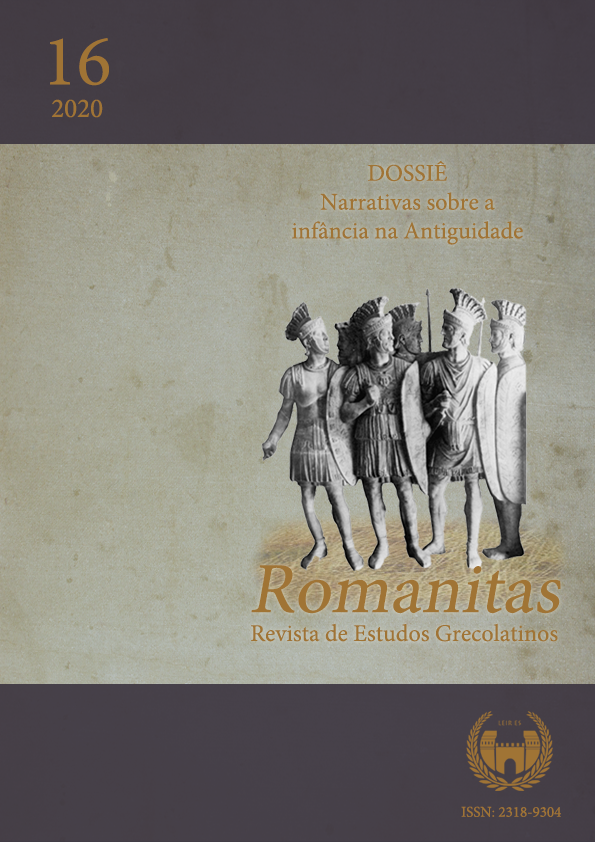O santuário de Elêusis na Ática a partir de relatos dos viajantes antiquaristas (do séc. XVII ao XIX): um estudo de caso sobre os usos da cultura material
DOI:
https://doi.org/10.17648/rom.v0i16.31513Palavras-chave:
Antiquarianismo, Santuário de Elêusis, Cultura material, Relatos de viagem, Formação de identidades nacionaisResumo
Os relatos de viagem escritos por antiquaristas são importantes fontes para historiadores e arqueólogos, pois resguardam registros textuais e pictóricos de paisagens, monumentos e artefatos que remetem à Antiguidade Clássica, além de descreverem populações locais e as dinâmicas entre as paisagens antiga e moderna. Eles também podem ser interpretados como registros de um longo processo histórico de sucessivas retomadas da Antiguidade Clássica por sociedades modernas. Nesse sentido, este artigo tem como objetivo apresentar o santuário de Deméter e Core em Elêusis, na Ática (Grécia), a partir dos relatos de viajantes em passagem pelo vilarejo entre os séculos XVII e XIX. Propõe-se enquadrar essas obras em seu contexto histórico, compreendendo sua relevância tanto como importante fonte histórica visual e textual quanto explorando as consequências polêmicas do manejo das antiguidades por alguns antiquaristas.
Downloads
Referências
Documentação textual
CLARKE, E. D. Travels in various countries of Europe Asia and Africa. London: Cadell and Davies, 1814.
LE ROY, J. The ruins of the most beautiful monuments of Greece. Introduction by Robin Middleton. Translation by David Britt. Los Angeles: Getty Publications, 2004.
SPON, J. Voyage d’Italie, de Dalmatie, de Grèce et du Levant, fait aux années 1675-1676. Amsterdam 1678. t. II. Disponível em: <https://archive.org/details/voyageditalieded02spon/page/n3/mode/2up>. Acesso em: 17 jun. 2020.
THE SOCIETY OF DILETTANTI. The Unedited Antiquities of Attica: comprising the architectural remains of Eleusis, Rhamnus, Sunium, and Thoricus. London, 1833. Disponível em: <https://digi.ub.uni-heidelberg.de/diglit/dilettanti1833/0003/image>. Acesso em: 17 jun. 2020.
WHELER, G. A journey into Greece in the company of Dr. Spon of Lyons. London, 1682.
Obras de apoio
ANDERSON, B. Imagined communities: reflections on the origins and spread of nationalism. Brooklyn: Verso Books, 1983.
BORDNAR, E. S. J. Cyriacus of Ancona and Athens. Brussels: Latomus, 1960.
BREMMER, J. Myths, mythology, and mythographers. In: BOYS-STONES, G; GRAZIOSI, B; VASUNIA, P. (ed.). The Oxford Handbook of Hellenic Studies. Oxford: Oxford University Press, 2009.
CHANDLER, R; REVETT, N. Travels in Asia Minor and Greece. Oxford: Clarendon Press, 1825. v. 2.
COSMOPOULOS, M. Bronze Age Eleusis and the origins of the Eleusinian Mysteries. Cambridge: Cambridge University Press, 2015.
DIÁZ-ANDREU, M. A World History of Nineteenth-Century Archaeology: nationalism, colonialism, and the past. Oxford: Oxford University Press, 2007.
DODWELL, E. A classical and topographical tour through Greece during the years 1801, 1805 and 1806. London: Rodwell and Martin, 1819.
DYSON, S. L. In pursuit of ancient pasts: a history of Classical Archaeology in the Nineteenth and Twentieth Centuries. New Haven/London: Yale University, 2006.
FAULKNER, A. (ed.). The Homeric Hymns: interpretative essays. Oxford: Oxford University Press, 2011.
HAMILAKIS, Y. The nation and its ruins: Antiquity, Archaeology, and national imagination in Greece. Oxford: Classical Presences, 2007.
JENKINS, I. Archaeologists and Aesthetes. London: British Museum Press, 1992.
JUDEICH, W. Athen im Jahre 1395 nach Beschreibung des Niccolò de Martoni. Athen: Athenische Mitteilungen, 1897, p. 423-438.
KELLY, J. M. The Society of Dilettanti: Archaeology and identity in the British Enlightenment. New Haven/London: Yale University Press, 2010.
KOHL, P. L. Nationalism and Archaeology: on the constructions of nations and the reconstructions of the remote past. Annual Review of Anthropology, v. 27, p. 223-246, 1998.
LENORMANT, L. Monographie de la Voie Sacrée éleusinienne, de ses monuments et ses souvenirs. Paris: Hachette, 1864.
LIPPOLIS, E. Eleusi, santuario dell’Impero. Bollettino di Archeologia Online, v. especial, p. 34-46, 2008.
LIPPOLIS, E. Mysteria: Archeologia e culto del santuario di Demetra ad Eleusi. Milano: Bruno Mondadori, 2006.
MENESES, U. B. de. A cultura material no estudo das sociedades antigas. Revista de História, n. 115, p. 103-117, 1983.
MESKELL, L. Introduction: Archaeology matters. In: MESKELL, L. (ed.). Archaeology under fire: nationalism, politics and heritage in the Eastern Mediterranean and Middle East. London: Routledge, 2002, p. 1-13.
MOMIGLIANO, A. As raízes clássicas da historiografia moderna. Bauru: Edusc, 2004.
MULRYAN, J. The Renaissance Mythographers. In: ZAJKO, V; HOYLE, H. (ed.). A Handbook to the Reception of Classical Mythology. London: Willey Blackwell. 2017.
MYLONAS, G. E. Eleusis and the Eleusinian Mysteries. Princeton: Princeton University Press, 2009.
MYLONAS, G. The Hymn to Demeter and her Sanctuary at Eleusis. Saint Louis: Washington University Studies, 1942.
PAPANGELI, K; CHLEPA, E. Transformations of the Eleusinian landscape antiquities and the modern city. Athens: Paul & Alexandra Canellopoulos Foundation, 2011.
PERISSATO, F. Elêusis no Império Romano: monumentalização do santuário e o culto dos Mistérios Eleusinos no Período Antonino. 2018. Dissertação (Mestrado em Arqueologia) – Programa de Pós-Graduação em Arqueologia da Universidade de São Paulo, São Paulo, 2018.
POLITIS, N. Traditions. Athens: P. D. Sakellariou, 1904.
REDFORD, B. Dilettanti: the Antic and the Antique in Eighteenth-Century England. Los Angeles: Getty Publications, 2008.
STUART, J; REVETT N. The Antiquities of Athens: measured and delineated by James Stuart and Nicholas Revett Painters and Architects. London: Thomas Bentham, 1816.
TRIGGER, B. História do pensamento arqueológico. São Paulo: Odysseus, 2004.
Downloads
Publicado
Como Citar
Edição
Seção
Licença
Copyright (c) 2021 Felipe Perissato

Este trabalho está licenciado sob uma licença Creative Commons Attribution-NonCommercial-NoDerivatives 4.0 International License.
a. Os autores mantêm os direitos autorais e concedem à revista o direito de primeira publicação.
b. Os autores têm autorização para assumir contratos adicionais separadamente, para distribuição não-exclusiva da versão do trabalho publicada nesta revista (ex.: publicar em repositório institucional ou como capítulo de livro), com reconhecimento de autoria e publicação inicial nesta revista.
c. Autores têm permissão e são estimulados a publicar e distribuir seu trabalho online (ex.: em repositórios institucionais ou na sua página pessoal) após a primeira publicação pela revista, com os devidos créditos.
d. Os textos da revista estão licenciados com uma Licença CC BY 4.0 Deed Atribuição 4.0 Internacional (CC BY).




























